La Crosse Technology K84285 User manual
- Category
- Alarm clocks
- Type
- User manual
This manual is also suitable for

1
Atomic Projection Alarm
with Indoor and Outdoor Temperature
Model K84285 | Instruction Manual
The Atomic Projection Alarm features accurate atomic time and indoor and outdoor temperature on a
stylish, colorful and easy-to-read display. Time and/or outdoor temperature can be projected on a wall or
ceiling. Use the integrated USB charging port to charge your devices when the Projection Alarm is
plugged into a power outlet.
Atomic Projection Alarm
Outdoor Temperature Transmitter: TX141

2
Table of Contents
Atomic Projection Alarm 1
Outdoor Temperature Transmitter TX141 1
Table of Contents 2
Features 3
Initial Setup 3
Power the Projection Alarm 4
A/C Adapter 4
Batteries 4
Install Batteries in the Outdoor Transmitter 4
WWVB Radio-controlled Time 5
WWVB Reception Icon 5
Manual Signal Search 5
Functions Buttons 5
Program Menu 6
WWVB Reception On/Off 6
Time Zone 6
Daylight Saving Time Indicator 7
12/24 Hour Time Format 7
Set Time 7
Set Calendar 7
Fahrenheit/Celsius 7
Alarm Set 8
Deactivate Alarm 8
Snooze 8
Backlight and Projection Intensity 8
Projection 8
Battery Operation 8
A/C Power 8
Rotate Projection 8
Change Projection Mode 8
USB Charge Port 9
Temperature Trend Icons 9
Low Battery Icon 9
Position Outdoor Transmitter 9
Position Projection Alarm 10
Care and Maintenance 10
Specifications 11
Accuracy 11
Warranty 12
FCC Statement 13
K84285
5V A/C Adapter
2-AAA batteries
TX141
2-AA batteries

3
Features
• Projects time & outdoor temperature on wall or ceiling
• Projection rotates in 90 degree increments
• Projection options: (1) Default: toggle between time and temperature, (2) time only or (3) temperature
only
• Time zones: Atlantic Time (AST), Eastern Time (EST), Central Time (CST), Mountain Time (MST),
Pacific Time (PST), Alaskan Time (AKT) & Hawaiian Time (HAT)
• Light up color display backlight and projection with a press of a button using battery power OR
continuous light with A/C adapter (ON/OFF option)
• Backlight and projection settings: High, low and off
• Charge devices with USB charging port: Output 0.5A
• Atomic time and date sets itself
• 12/24 hour time with minutes
• Snooze alarm and alarm icon
• Calendar: day, date
• IN/OUT temperature (°F/°C) with trend arrow
• Low battery icon for clock & sensor
• Sits on desktop or tabletop
• 5.0V A/C adapter (included) for primary power and battery backup
• Battery life is over 24 months when using the A/C adapter
Initial Setup
1. Insert A/C adapter into the wall outlet then into the display or insert 2 new AAA batteries (not
included) into the display (see Power the Atomic Projection Alarm). The Projection Alarm will light
up and display time and indoor temperature.
2. Insert 2 new AA batteries into the transmitter, observing the correct polarity (see Install Batteries in
the Outdoor Transmitter).
3. Keep the transmitter 5-10 feet from the Projection Alarm for 15 minutes to establish a good
connection.
4. Within 3 minutes, the outdoor temperature should be displayed on the Projection Alarm. If the outdoor
temperature is not displayed after 3 minutes, remove power from the transmitter and the display for
60 seconds and start again from step 1.
5. For optimum 433 MHz transmission, the outdoor transmitter should be placed a distance of no more
than 200 feet (60 meters, open air) from the Projection Alarm.
IMPORTANT: When operating on A/C power, the backlight, projection and USB charging port will turn off
while the Projection Alarm searches for the WWVB signal, to avoid interference. The backlight and
projection will return after the 2-10 minute search. The USB charging port will then resume working.
• Do Not Mix Old and New Batteries
• Do Not Mix Alkaline, Standard, Lithium or Rechargeable Batteries

4
Power the Projection Alarm
The Projection Alarm can be powered by the 5-volt A/C adapter or2 AAA batteries.
A/C power adapter
• Insert enclosed 5-volt A/C power adapter into a wall outlet, then into the Projection Alarm.
Optional Battery Operation
1. To remove battery cover, slide tab to the right and pull out to remove battery cover.
2. Install two new AAA batteries according to the polarity markings.
• Do Not Mix Old and New Batteries
• Do Not Mix Alkaline, Lithium, Standard or Rechargeable Batteries
If the Projection Alarm does not display indoor temperature after 60 seconds, remove adapter and
batteries, and wait for at least 60 seconds before repeating the setup process.
IMPORTANT: When operating on A/C power, the backlight, projection and USB charging port will turn off
while the Projection Alarm searches for the WWVB signal, to avoid interference. The backlight and
projection will return after the 2-10 minute search. Then the USB charging port will resume working.
Install Batteries in the Outdoor Transmitter
1. Slide the battery cover down, then lift off the front of the transmitter.
Note: Be careful not to break the tabs on the battery cover.
2. Insert two new AA batteries into the transmitter. Observe the correct polarity (see markings
inside battery compartment).
3. Keep transmitter 5-10 ft. from the Projection Alarm during setup.
4. After 15 minutes, if the outdoor temperature shows on the display, you can move the
outdoor transmitter outside to a shaded location within range of the Projection Alarm.
Troubleshooting
• If the Projection Alarm does not display the outdoor temperature after 3 minutes, remove the A/C
power adapter and all batteries from both units and start the setup process again.
• If the outdoor temperature does not show up after a second attempt, please slide open the battery
cover of the outdoor transmitter to reveal the TX button. Press the TX button for 3 seconds to send a
wireless signal to the Projection Alarm.
• Hold the +/TEMP button for 5 seconds so the clock will search for the sensor.
• For optimal 433 MHz signal reception, the outdoor transmitter should be placed within 200 feet (60
meters) from the Projection Alarm.
Battery
Compartment
5-Volt a/c adapter

5
WWVB Radio-controlled Time
The NIST radio station, WWVB, is located in Ft. Collins, Colorado and transmits the exact time signal
continuously throughout the United States at 60 kHz. The signal can be received up to 2,000 miles away
through the internal antenna in the Projection Alarm. However, due to the nature of the Earth’s
Ionosphere, reception is very limited during daylight hours. The Projection Alarm will search for a signal
every night when reception is best. The WWVB radio station derives its signal from the NIST Atomic
Clock in Boulder, Colorado. A team of physicists continually measures every second of every day to an
accuracy of ten billionths of a second a day. These physicists have created an international standard,
measuring a second as 9,192,631,770 vibrations of a Cesium 133 atom in a vacuum. This atomic clock
regulates the WWVB transmitter.
WWVB Reception Icon
The icon with full signal strength will appear on screen in front of the date when the
reception of atomic time is successful.
• The tower icon will show solid when the display has received the WWVB signal.
• No tower icon displayed. The display was unable to receive a signal at this time.
• Reposition the display for better signal reception or try again at bedtime.
• The display will start searching at UTC: 07:00 and if no reception on the first attempt
they will try again at 08:00, 09:00 and 10:00. Each attempt will be at least 2 minutes and the most will
be 10 minutes.
• If there is no signal or too much interference, the receiver will only be on for 2 minutes.
• If the signal is good, it may catch a signal in ABOUT 2-3 minutes.
• If the signal is marginal, it will try to catch a signal for up to 10 minutes.
• IMPORTANT: When operating on A/C power, the backlight, projection and USB charging port will
turn off while the Projection Alarm searches for the WWVB signal, to avoid interference. The backlight
and projection will return after the 2-10 minute search (which occurs during the late night or early
morning hours). Then the USB charging port will resume working.
Note: In case the Projection Alarm is not able to detect the WWVB-signal (disturbances, transmitting
distance, etc.), the time may be manually set.
Manual Signal Search
In normal mode, hold the RCC button until the reception icon appears to force a search of the WWVB
signal. The WWVB icon will flash during the search. If this icon disappears after the 2 minute search,
the radio time signal is not available at the moment.
• Recommended distance to any interfering sources like computer monitors or TV sets is a minimum of
6 feet (2 meters).
• Within ferro-concrete rooms (basements, superstructures, etc.), the received signal is naturally
weakened. In extreme cases, please place the unit close to a window and/or point its front or back
towards the Fort Collins, Colorado.
• During nighttime, the atmospheric disturbances are usually less severe and reception is possible in
most cases. A single daily reception is adequate to keep the accuracy deviation below 1 second.
Note: In case the Projection Alarm is not able to detect the WWVB-signal (disturbances, transmitting
distance, etc.), the time and date can be manually set (see “program menu”).
Function Buttons
SNOOZE/LIGHT/HI/LOW/OFF (TOP)

6
Button
Press and Release Functions
Hold 2 seconds
SET/°C/°F
Move through program menu (setup)
Select temperature in °C/°F
Enter program menu, set time,
date, etc. (setup)
ALARM
Once: View Alarm
Twice: Activate or Deactivate Alarm
Alarm set
+/TEMP
1 step forward (setup)
Search for Sensor
Fast advance (setup)
-/TIME
1 step backward (setup)
Fast backward ( setup) WWVB
Search
PROJECTION
Rotate Projection 90 degrees
Change what is projected:
Time/Outdoor Temp alternating
(default)
Once:
Time only
Twice: Outdoor Temp only
Third time: Time/Outdoor
Temp alternating (default)
SNOOZE/LIGHT
HI/LOW/OFF
Once: Backlight and Projection low
intensity (A/C)
Twice: Backlight and Projection OFF
(A/C)
Third time: Backlight and projection ON
high intensity (default, A/C
adapter)
Battery Power: Activate backlight for 10
seconds
Trigger snooze alarm (ringing)
Program Menu
The SET button will moves through the items in the program menu. The +/TEMP or -/TIME buttons will
change these values:
• WWVB reception ON or OFF
• Time Zone (Seven Time Zones)
• Daylight Saving Indicator
• 12/24 hour time format
• Manual time set (Hour, Minutes)
• Calendar set (Year, Month, Date)
WWVB Time Reception
The WWVB time reception defaults to ON. To turn the WWVB reception OFF:
1. Hold the SET button for 5 seconds.
2. WWVB and ON will flash.
3. Press and release the +/TEMP or -/TIME buttons to turn this OFF.
4. Confirm with the SET button and move to the Time Zone.
Time Zone
This station offers seven time zones listed in letter format (default is EST):
• AST Atlantic Time
• EST Eastern Time
• CST Central Time
• MST Mountain Time
• PST Pacific Time
• AKT Alaskan Time
• HAT Hawaiian Time
1. EST will flash.
2. Press and release the +/TEMP or -/TIME buttons to select a different Time Zone.
WWVB
ON
TIME
ZONE
EST

7
3. Confirm with the SET button and move to Daylight Saving Indicator.
Daylight Saving Indicator
DST will default to the ON position as most of the country observes the DST change. If you live in an
area does not observe the DST change, switch this to the OFF position.
1. DST and ON will flash.
2. Press and release the +/TEMP or -/TIME buttons to turn DST to OFF.
3. Confirm with the SET button and move to 12/24 hour time format.
12/24 Hour Time Format
The Time may be displayed in 12-hour or 24-hour format. Default is 12-hour time.
Note: When in 12-hour format AM or PM will show in front of the hour.
1. 12H will flash.
2. Press and release the +/TEMP or -/TIME buttons to select 24-hour time.
3. Confirm with the SET button and move to Set Time.
Set Time
To set the time manually:
1. The hour digit will flash.
2. Press and release the +/TEMP or -/TIME buttons to select the hour.
3. Press and release the SET button to set the minutes.
4. The minutes digit will flash.
5. Press and release the +/TEMP or -/TIME buttons to select the minutes.
6. Confirm with the SET button and move to Set Calendar.
Set Calendar
The date default of the Projection Alarm is 1.1.2010.
To set the calendar:
1. The year will flash.
2. Press and release the +/TEMP or -/TIME buttons to set the year (between year 2010-2039).
3. Press the SET button again to confirm and to enter the month setting.
4. The month will flash.
5. Press and release the Press and release the +/TEMP or -/TIME buttons to set the month.
6. Press the SET button again to confirm and enter date setting.
7. The date will flash.
8. Press and release the +/TEMP or -/TIME buttons to set the date.
9. Confirm all calendar settings with the SET button to confirm and exit the program menu.
Note: The day of the week will set automatically once the year, month and date are set.
Fahrenheit/Celsius
1. Press and release the SET/°C/°F button once to switch from Fahrenheit to Celsius.
DST
ON
12H
2010
1M.1D

8
Alarm Set
Hold the ALARM button for 5 seconds to enter the alarm time set mode.
1. The alarm hour digit will flash.
2. Press and release the +/TEMP or -/TIME buttons to select the hour.
3. Press and release the SET button to set the minutes. The minute digits
will flash.
4. Press and release the +/TEMP or -/TIME buttons to select the minutes.
5. Press and release ALARM to confirm the alarm settings, then press and release SET button to exit.
6. The alarm icon
will show after the minutes indicating the alarm is active.
7. The alarm icon
will flash when the alarm is sounding.
Deactivate Alarm
1. Press and release the ALARM button once to show Alarm Time.
2. Press and release the ALARM button to deactivate the Alarm. The
alarm icon will disappear
indicating the alarm is no longer active.
Snooze
1. When the alarm sounds, press the SNOOZE/LIGHT button to trigger snooze alarm for 10 minutes.
The snooze icon Zz will flash when the snooze feature is active.
2. To stop alarm for one day, press ALARM button, while in snooze mode. The alarm icon
will remain
solid.
Note: When the alarm sounds, it continues for 2 minutes and then shuts off completely.
Backlight and Projection Intensity
Hold two seconds, and then release the SNOOZE/LIGHT button to adjust the brightness of the backlight
and projection (together):
• ON High intensity: (default setting on A/C power)
• ON Low intensity: Hold and release SNOOZE/LIGHT button once
• OFF: Hold and release SNOOZE/LIGHT button
• ON High intensity (default): Hold and release SNOOZE/LIGHT button
Projection
• Battery Power: Press and release the SNOOZE/LIGHT button to show the projection for 10 seconds.
• Note: Projection will not display constantly when operating on battery power.
• A/C Power: Projection is displayed constantly
• Note: can be turned off see “Backlight and Projection Intensity”
• Rotate Projection: Press and release the PROJECT button to rotate projection image 90 degrees on
the wall or ceiling. Press and release the PROJECT button again to rotate another 90 degrees.
• Change Projection Mode: Hold two seconds, and then release the PROJECT button to switch
projection modes. You will need to watch the projection image to view the changes.
o Time and Outdoor Temperature: alternate every 5 seconds (default)
o Time: Hold and release PROJECT button
o Outdoor Temperature: Hold and release PROJECT button again
Note: Both time and outdoor temperature will not show at the same time.

9
Projection Arm Rotation: The projection arm can be rotated 180 degrees to view
the projection on the wall or ceiling.
USB Charge Port
The integrated USB charging port (on back) will charge your smart
phone, camera or other devices when the Projection Alarm is plugged
into a power outlet with the included 5V A/C adapter.
Note: This is a power-output charging port. The charging port does not
supply power to the Projection Alarm.
Begin charging your external device by connecting the device’s USB
charging cable (not included) to the USB charging port on the back of
the Projection Alarm. Charging times will vary.
Note: Some USB cables are for data transfer only and cannot be used
for charging. Make sure that the USB cable you use will charge your
device. Most USB cables included with mobile devices will work for charging.
• USB Power Output: 1A maximum current
• Do NOT over load USB port. Charge 0.5A devices or less only
IMPORTANT: When operating on A/C power, the backlight, projection and USB charging port will turn off
while the Projection Alarm searches for the WWVB signal, to avoid interference. The backlight and
projection will return after the 2-10 minute search (which occurs during the late night or early morning
hours). The USB charging port will then resume working.
Temperature Trend Icons
The indoor and outdoor temperature trend indicators are updated every 30 minutes. These trends
represent temperature changes over the past three hours.
Temperature rose more than 2°F /1°C in the past three hours
Temperature has not changed more than 2°F /1°C in the past three hours
Temperature fell more than 2°F /1°C in the past three hours
The temperature trend indicators are shown next to the indoor temperature and outdoor temperature
readings.
Outdoor Temperature Flashing
• Low battery icon
present: Change batteries in the transmitter, and then hold the CH button until
the station beeps to search for the outdoor transmitter again.
• End of Transmission Range: Move the transmitter closer to the display. Avoid obstructions in the
signal path. Keep transmitter and display away from electronics.
Low Battery Icon
• When this icon
appears in the indoor (IN) data reading section, replace the batteries in the
Projection Alarm.
• When this icon
appears in the outdoor (OUT) data readings section, replace the batteries in the
outdoor transmitter.
Position the Outdoor Transmitter
Once the Projection Alarm shows the outdoor temperature, place the Projection Alarm and the transmitter
in the desired locations and wait approximately 1 hour before permanently mounting the transmitter to
ensure that there is proper reception. The transmitter should be mounted vertically, in a shaded,

10
protected area, at least 6 feet from the ground to avoid damage and ensure accurate readings. The
transmitter is water resistant, not waterproof and should not be placed anywhere it will become
submerged in water or subject to standing water or snow.
Choose a location for the transmitter that is within range of the Projection Alarm and under an overhang
for accuracy. Wireless transmitting range in open air is over 200 feet (60 meters) from outdoor transmitter
to Projection Alarm.
Option 1:
• Install one mounting screw (not included) into a wall leaving approximately ½ of an inch
(12.7mm) extended.
• Place the transmitter onto the screw, using the hanging hole on the backside.
• Gently pull the transmitter down to lock the screw into place.
Option 2:
• Insert the mounting screw (not included) through the front of the transmitter and into the
wall.
• Tighten the screw to snug (do not over tighten).
To achieve a true temperature reading, mount where direct sunlight cannot reach the outdoor transmitter.
Mount the outdoor transmitter on a North-facing wall or in any well shaded area. Under an eave or deck
rail work well. The maximum transmitting range in open air is over 200 feet (60 meters). Obstacles such
as walls, windows, stucco, concrete and large metal objects can reduce the range. Place the transmitter
at least 6 feet in the air to improve signal transmission.
Position the Projection Alarm
1. The Projection Alarm has a wide base to sit on a desk or table.
2. Choose a location 6 feet or more from electronics such as cordless phones, gaming systems,
televisions, microwaves, routers, etc.
3. Place within range of the outdoor transmitter.
4. The maximum transmitting range in open air is 200 feet (60 meters). Obstacles such as walls,
windows, stucco, concrete and large metal objects can reduce the range.
5. For best WWVB reception orientate the Projection Alarm with the front of the back facing Ft. Collins,
Colorado.
Care and Maintenance
• Do Not Mix Old and New Batteries
• Do Not Mix Alkaline, Standard, Lithium or Rechargeable Batteries
• Do not expose the Projection Alarm to extreme temperatures, vibration or shock.
• Keep Projection Alarm dry.
• Clean the Projection Alarm with a soft damp cloth. Do not use solvents or scouring agents.
• The Projection Alarm is not a toy. Keep it out of reach of children.
• The Projection Alarm is not to be used for medical purpose or for public information. It is for home use
only.
• The specifications of this Projection Alarm may change without prior notice.
• Improper use or unauthorized opening of housing will void the warranty.
• If the unit does not work properly, change the batteries and/or check the A/C cord connection.
Specifications
Indoor
Temperature Range: +32°F to +122°F (0°C to 50°C)
Accuracy: +/- 2°F
Interval: About every 30 seconds
Outdoor
Temperature Range: -40°F to 140°F (-40°C to 60°C)

11
Alkaline Batteries: -20°F to 140°F (-28.8°C to 60°C)
Lithium Batteries: -40°F to 140°F (-40°C to 60°C)
Temperatures below -20°F (-28.8°C) require Lithium batteries in the
outdoor sensor.
Distance: 200 feet (60 meters) RF 433MHz (open air)
Interval: About every 50 seconds
Power
Atomic Projection Alarm: 5-volt A/C power adapter (included)
Optional 2-AAA, IEC, LR3 batteries (not included)
TX141 Transmitter: 2-AA, IEC, LR6 batteries (not included)
USB: Output 0.5 Amp maximum. Do not overload USB port.
Battery Life
TX141 Transmitter
Battery Life: Battery life is over 24 months when using reputable battery brands for
both Alkaline and Lithium batteries
Atomic Projection Alarm
Battery Backup: Battery life is over 24 months when using the AC adapter for primary
power
Dimensions
Atomic Projection Alarm: 5.23” W x 4.33” H x 1.96” D (133 x 110 x 50mm)
TX141 Transmitter: 1.57" L x 0.79" W x 5.12" H (40 x 20 x 130 mm)
Accuracy
Indoor Temperature
• Operating temperature range: 32°F to 122°F (0°C to 50°C)
• Accuracy: ± 2°F 32°F to 122°F (0°C to 50°C)
• Resolution: 0.1°F
• When above 122°F (50°C) the temperature sensor should continue to read the correct temperature
as long as the LCD display continues to function.
• When below 32°F (0°C) the temperature sensor should continue to read correctly as long as the LCD
display continues to function.
Outdoor Temperature
• Operating temperature range: -40°F to 140°F (-40°C to 60°C)
• Accuracy: ± 2°F 32°F to 122°F (0°C to 50°C)
• Accuracy: ±4°F (-40°F to 32°F (-40°C to 0°C);122°F to140°F (50°C to 60C°))
• Resolution: 0.1°F
• When above 140°F (60°C), the temperature sensor should continue to read the correct temperature
as long as the LCD display continues to function.
• When below -40°F (-40°C), the temperature sensor should transmit continue to read correctly as long
as the LCD display continues to function.

12
Warranty Information
La Crosse Technology, Ltd provides a 1-year limited warranty on this product against manufacturing
defects in materials and workmanship.
This limited warranty begins on the original date of purchase, is valid only on products purchased and
used in North America and only to the original purchaser of this product. To receive warranty service, the
purchaser must contact La Crosse Technology, Ltd for problem determination and service procedures.
Warranty service can only be performed by a La Crosse Technology, Ltd authorized service center. The
original dated bill of sale must be presented upon request as proof of purchase to La Crosse Technology,
Ltd or La Crosse Technology, Ltd’s authorized service center.
La Crosse Technology, Ltd will repair or replace this product, at our option and at no charge as stipulated
herein, with new or reconditioned parts or products if found to be defective during the limited warranty
period specified above. All replaced parts and products become the property of La Crosse Technology,
Ltd and must be returned to La Crosse Technology, Ltd. Replacement parts and products assume the
remaining original warranty, or ninety (90) days, whichever is longer. La Crosse Technology, Ltd will pay
all expenses for labor and materials for all repairs covered by this warranty. If necessary repairs are not
covered by this warranty, or if a product is examined which is not in need or repair, you will be charged for
the repairs or examination. The owner must pay any shipping charges incurred in getting the La Crosse
Technology, Ltd product to a La Crosse Technology, Ltd authorized service center. La Crosse
Technology, Ltd will pay ground return shipping charges to the owner of the product to a USA address
only.
The La Crosse Technology, Ltd warranty covers all defects in material and workmanship with the
following specified exceptions: (1) damage caused by accident, unreasonable use or neglect (including
the lack of reasonable and necessary maintenance); (2) damage occurring during shipment (claims must
be presented to the carrier); (3) damage to, or deterioration of, any accessory or decorative surface; (4)
damage resulting from failure to follow instructions contained in the owner’s manual; (5) damage resulting
from the performance of repairs or alterations by someone other than an authorized La Crosse
Technology, Ltd authorized service center; (6) units used for other than home use (7) applications and
uses that this product was not intended or (8) the products inability to receive a signal due to any source
of interference.. This warranty covers only actual defects within the product itself, and does not cover the
cost of installation or removal from a fixed installation, normal set-up or adjustments, claims based on
misrepresentation by the seller or performance variations resulting from installation-related
circumstances.
LA CROSSE TECHNOLOGY, LTD WILL NOT ASSUME LIABILITY FOR INCIDENTAL,
CONSEQUENTIAL, PUNITIVE, OR OTHER SIMILAR DAMAGES ASSOCIATED WITH THE
OPERATION OR MALFUNCTION OF THIS PRODUCT. THIS PRODUCT IS NOT TO BE USED FOR
MEDICAL PURPOSES OR FOR PUBLIC INFORMATION. THIS PRODUCT IS NOT A TOY. KEEP OUT
OF CHILDREN’S REACH.
This warranty gives you specific legal rights. You may also have other rights specific to the State. Some
States do not allow the exclusion of consequential or incidental damages therefore the above exclusion of
limitation may not apply to you.
For warranty work, technical support, or information contact:
La Crosse Technology, Ltd
2817 Losey Blvd. S.
La Crosse, WI 54601 Online at:
www.lacrossetechnology.com/k84285
Protected under U.S. Patents:
Contact Support: 1-608-782-1610 5,978,738
6,076,044
Product Registration: 6,597,990
www.lacrossetechnology.com/support/register
Printed in China

13
FCC Statement
This Device complies with Part 15 of the FCC Rules. Operation is subject to the following two conditions:
(1) This device may not cause harmful interference, and (2) the device must accept any interference
received, including interference that may cause undesired operation.
NOTE: THE MANUFACTURER IS NOT RESPONSIBLE FOR ANY RADIO OR TV INTERFERENCE
CAUSED BY UNAUTHORIZED MODIFICATIONS TO THIS EQUIPMENT. SUCH MODIFICATIONS
COULD VOID THE USER AUTHORITY TO OPERATE THE EQUIPMENT
All rights reserved. This handbook must not be reproduced in any form, even in excerpts, or duplicated or
processed using electronic, mechanical or chemical procedures without written permission of the
publisher.
This handbook may contain mistakes and printing errors. The information in this handbook is regularly
checked and corrections made in the next issue. We accept no liability for technical mistakes or printing
errors, or their consequences.
All trademarks and patents are acknowledged.
-
 1
1
-
 2
2
-
 3
3
-
 4
4
-
 5
5
-
 6
6
-
 7
7
-
 8
8
-
 9
9
-
 10
10
-
 11
11
-
 12
12
-
 13
13
La Crosse Technology K84285 User manual
- Category
- Alarm clocks
- Type
- User manual
- This manual is also suitable for
Ask a question and I''ll find the answer in the document
Finding information in a document is now easier with AI
Related papers
-
La Crosse 616-146 User manual
-
La Crosse Technology 616-146 User manual
-
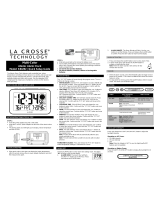 La Crosse Technology K84292 Quick start guide
La Crosse Technology K84292 Quick start guide
-
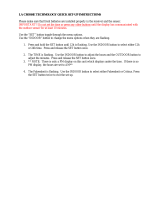 La Crosse Technology wireless weather station User manual
La Crosse Technology wireless weather station User manual
-
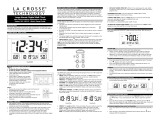 La Crosse Technology 513-1311OT Quick Setup Manual
La Crosse Technology 513-1311OT Quick Setup Manual
-
La Crosse WS-8119U User manual
-
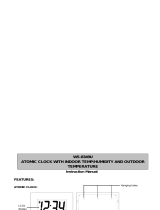 La Crosse Technology WS-8349U User manual
La Crosse Technology WS-8349U User manual
-
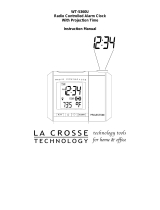 La Crosse Technology WT-62U User manual
La Crosse Technology WT-62U User manual
-
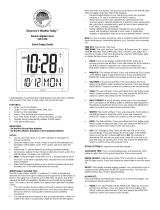 La Crosse Technology 515-1316 User manual
La Crosse Technology 515-1316 User manual
-
La Crosse Technology 616-143 Installation guide
Other documents
-
Marathon CL030064 User manual
-
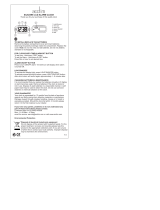 Acctim BLK SILICONE RUBBER CASE CLOCK User manual
Acctim BLK SILICONE RUBBER CASE CLOCK User manual
-
Timex 75322A1 User manual
-
AcuRite 75322A1 User manual
-
Technoline Model User manual
-
 Oregon Scientific RM318PA User manual
Oregon Scientific RM318PA User manual
-
La Crosse 616-146v4 User guide
-
La Crosse 70905 User manual
-
Marathon CL030063 User manual
-
Balance 972483 Datasheet




















